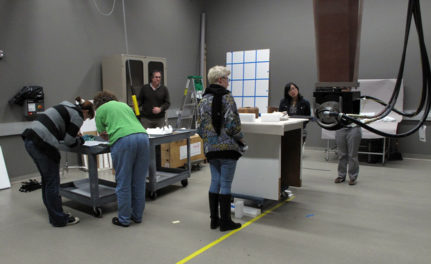More videos:
• Has Los Angeles’s ecology of evil improved?
• Are Huffington Post bloggers “volunteer slaves”?
• What do you think about the dismantling of the Barnes Foundation?
On Monday we put out a call on Facebook and Twitter for questions for Peter Plagens, the painter and critic (Newsweek, Wall Street Journal) speaking tonight as part of our Getty Perspectives series. We invited him to pick a single question to answer, or maybe two. But apparently, we didn’t really know Peter. He has energy, wit, and generosity to share, and he first picked three of your questions to answer on video (up soon on our YouTube channel; keywords: Barnes Foundation, Huffington Post), then grabbed a jumpseat and wrote up the rest. Thanks to Peter and to everyone who shared.
Which silence do you prefer: the silence of written words that never seem to be the right words, or the silence of images that never seem to show what one wants to show?
Probably the silence of images. Words are the most common currency of culture, and when you get them wrong, everybody knows about it. Plus, there’s a sense of deed-done in “saying” something that you can’t retract afterward. Images—at least static art images—are more revisable without people thinking they’ve caught you out.
What’s your take on art for art’s sake versus commercial advertising art?
The great art historian E.H. Gombrich thought—and I’m oversimplifying here—that Western art started to go downhill when artists began to produce on spec, that is, when they stopped producing art on commission for a client to promote something (e.g., Catholicism or a kingdom), i.e., a form of commercial advertising art. So my answer is just to stand that on its head and say that just because art is produced on commission for a client to promote something doesn’t automatically disqualify it from being considered as art-art. Having said that, though, it’s my cranky opinion that most commercial advertising art is long on technique and cleverness, but short on depth. Then again, I’m a painter, so I would say that, wouldn’t I?
What are you most passionate about and why?
This is a horrible cliche, but probably art. I’ve been young and old, flush and hard up, in love and out of love, sick and well, employed and freelance, and through all of that, the constant in my life has been art—specifically painting paintings and thinking seriously about (certain) other people’s art.
Do you agree with the notion that art has come to an end?
No, but it’s rather obvious that certain aspects of modern art have either come to an end or stalled out: the monodirectional avant-garde, a hierarchy of media, the artist as a kind of anti-professional loner, the artist as opposed to popular culture, etc. To be specific, I don’t agree with Arthur Danto that Andy Warhol’s Brillo Boxes signaled the end of art as we know it. (Professor Danto doesn’t agree with that, either, and goes to great lengths to explain the philosophical complications of his position.)
What do you think of the distinction between art and craft?
I usually hear this from disgruntled ceramists, and this is what I usually answer:
- Our culture makes that distinction (the Japanese have a potter designated a living national treasure; we’d never do that);
- Craftspeople can’t have it both ways—an equal footing with “fine art” and special protected provinces of craft and media;
- “Art” doesn’t make much distinction among media anymore, so anybody who wants to plunge into “art” with clay or the materials of woodworking is welcome to do it;
- Maybe this should have been put first—the Industrial Revolution screwed things up, because many things that were formerly the products of “craft” were replaced for most people by machine-made objects.
But this is a big philosophical issue that can’t be done justice in a short (?) answer like this.
Who do you consider the greatest forgotten artist of the ages?
I can’t answer for the ages, and if the artist is really forgotten, I probably don’t know about him or her. But if we ratchet it down to “underrated”: Emily Carr, Sidney Nolan, Ben Nicholson, Tivadar Csontváry. All are painters, sure, but that’s what I know most about.
The Getty or the Louvre? Why?
I presume you are talking about the respective museums, in which case the question isn’t fair. The Louvre is huge museum, the Getty Museum is fairly small by comparison. The Getty Museum vs. the Norton Simon Museum would be a more interesting question (which I can’t answer), or the Louvre vs. the Met in New York (same non-answer).
Text of this post © J. Paul Getty Trust. All rights reserved.




Comments on this post are now closed.